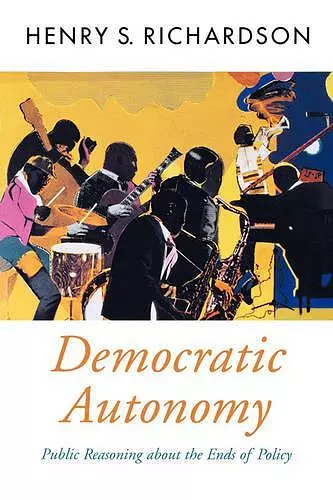Democratic Autonomy
Public Reasoning about the Ends of Policy
Format:Paperback
Publisher:Oxford University Press Inc
Published:8th Jan '04
Currently unavailable, currently targeted to be due back around 25th January 2025, but could change

What would our decision-making procedures look like if they were actually guided by the much-discussed concept of "deliberative democracy"? What does rule by the people for the people entail? And how can a modern government's reliance on administrative agencies be reconciled with this populist ideal? What form must democratic reasoning take in the modern administrative state? Democratic Autonomy squarely faces these challenges to the deliberative democratic ideal. It identifies processes of reasoning that avert bureaucratic domination and bring diverse people into political agreement. To bridge our differences intelligently, Richardson argues, we cannot rely on instrumentalist approaches to policy reasoning, such as cost-benefit analysis. Instead, citizens must arrive at reasonable compromises through fair, truth-oriented processes of deliberation. Using examples from programs as diverse as disability benefits and environmental regulation, he shows how the administrative policy-making necessary to carrying out most legislation can be part of our deciding what to do. Opposing both those liberal theorists who have attacked the populist ideal and those neo-republican theorists who have given up on it, Richardson builds an account of popular rule that is sensitive to the challenges to public deliberation that arise from relying on liberal constitutional guarantees, representative institutions, majority rule, and administrative rulemaking. Written in a non- technical style and engaged with practical issues of everyday politics, this highly original and rigorous restatement of what democracy entails is essential reading for political theorists, philosophers, public choice theorists, constitutional and administrative lawyers, and policy analysts.
"Democratic Autonomy offers a sophisticated, closely argued account of democratic reasoning, both as a norm and as institutional practice. Richardson shows that we can hope to bridge even deep disagreements over ends through a process of principled compromise. He rebuts the naive view that legislatures delegate only narrow technical questions of means to administrative agencies. The author demonstrates that if we are serious about democracy, we must find ways of extending effective citizen participation into arenas now dominated by bureaucratic rule-making. This book is a must for all readers interested in the theory and practice of modern democracy."--William A. Galston, Director, Institute for Philosophy and Public Policy, University of Maryland
"In Democratic Autonomy Richardson applies his important work about deliberative practical reasoning and the "specification of ends" to a major problem in democratic theory and practice: How can a modern society that must depend on the expertise of administrative agencies still be a democracy, characterized by genuine self-rule? Written in a clear and accessible style, the book should be required reading, not only for theorists of democracy and public choice, but also for policy makers and legislators."--Martha Nussbaum, Ernst Freund Distinguished Service Professor of Law and Ethics, University of Chicago
"This wonderful book articulates an ideal of democratic rule grounded in the republican tradition of thought; details the practice of deliberation - incorporating a division of deliberative labour - that this ideal requires; and then illustrates the shape that this practice would dictate for every aspect of government, from the electoral to the bureaucratic. It is a fresh and invigorating contribution to democratic theory and deserves to have a transforming effect on the subject."--Philip Pettit, Princeton University
"This is a stunningly good book. Professor Richardson has enriched Democratic Autonomy with more concrete detail and a better-informed apprehension of how the modern administrative state actually functions, than one finds in most works of political philosophy. It is still philosophy, however, but in the best sense - a finely crafted rigorous argument about deliberation, freedom, and collective decision-procedures. As a result, it offers a more convincing vindication of the idea of popular self-government for modern society than any work of democratic theory published in recent years."-- Jeremy Waldron, Maurice & Hilda Friedman Professor of Law, and Director of the Center for Law and Philosophy, Columbia Law School
ISBN: 9780195150919
Dimensions: 238mm x 158mm x 23mm
Weight: 454g
328 pages